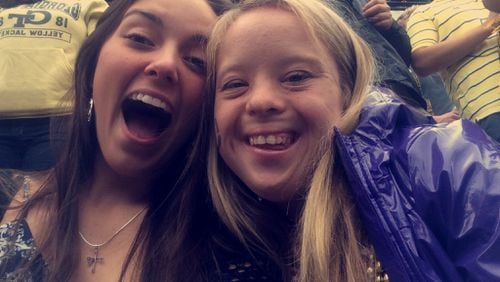Two years ago, Alexandria “Alex” Goodman wasn’t sure what her life might look like.
For one thing, the options after high school graduation for students with mild intellectual and developmental disabilities like Alex were almost nonexistent.
She’d met the end of the educational road. Typically, Alex, who has Down syndrome, could either remain in high school until age 21, or perhaps work in a segregated sheltered environment for less than minimum wage, mostly with other people with disabilities. College was just a dream.
Then last year, Alex's parents heard about Georgia Tech's EXCEL program, and what was once unimaginable in these parts seemed within reach.
Expanding Career, Education and Leadership Opportunities, according to program director Ken Surdin, is the brainchild of Terry Blum, founding director of Georgia Tech’s Institute for Leadership and Entrepreneurship and mother of a daughter with a developmental disability.
At the time, there was one college option for students with disabilities in metro Atlanta — the Academy for Inclusive Learning and Social Growth at Kennesaw State University — and only 200 across the country.
Because Tech is considered a model of service and progress, filled with people working to make the world a better place, Blum asked why not here? After all, service and progress include being a model for diversity and inclusion.
With the help of colleague Cyrus Aidun, Blum launched EXCEL in 2014 with the expectation of being an exemplary program.
Their mission: to provide students with mild intellectual and developmental disabilities the opportunity to pursue postsecondary education like the rest of us.
“Excellence is our goal,” Surdin said. “We want to make a difference in the lives of these students, increase their independence so that they are able to live more meaningful lives, develop interests and career skills that will lead to employment in a job that they like.”
When the program launched last year, eight students were enrolled. That number has nearly doubled to 13, and will increase to 24 next fall.
And so there they were the other day in a second-floor classroom, seated alongside their mainstream peers, participating on the eve of the recent presidential debate in a lively discussion about current events.
For a full hour, they let loose, sharing their observations and opinions.
“I thought that it was a pretty good debate, but they were talking over one another,” one offers early in the discussion.
Here Ashley Bidlack, EXCEL curriculum developer and lecturer, is driving this one that sounds surprisingly like a panel of political pundits on CNN or MSNBC.
They are less than 10 minutes in, when one student said she’d seen on the internet Trump dressed as a girl.
“Does anybody know what we talked about last week?” Bidlack asks.
“What to trust on the internet and what not to.”
Bidlack jumps in again when one of them suggests Trump was playing mind games.
“Try to keep comments as neutral as possible since there are people here who might support Trump,” she says.
This is part and parcel of what Blum envisioned, of what can happen when we refuse to put a limit on what’s possible.
From the time Alex was a little girl, Paula and David Goodman dreamed of the day she would attend college. When they found out about Tech's program, they immediately went to check it out.
“Being the prestigious university it is, we believed any program there would be a good one,” Paula Goodman said. “Beyond that, we knew given the opportunity, Alex could pursue her dream, continue learning and be a valued and productive member of society.”
Just as Alex graduated from the Starr’s Mill High School in 2014, EXCEL was about to open its doors.
“It was just a win-win,” Paula Goodman said.
For her part, Alex, 22, is enjoying all the pomp and circumstance of college. She shares a high-rise apartment with three other students. She attends football games and college parties. And when she isn’t in class or doing homework, she works part time at a recreation center.
Earlier this year, a national study found that two years after high school, students with disabilities were less likely than their peers to have attended any postsecondary education — 42 percent compared with 67 percent — at four-year colleges, though that includes students with all types of disabilities.
What’s worse, students with intellectual and developmental disabilities have 256 options for postsecondary education while their peers have more than 5,000.
EXCEL is a fully inclusive, four-year program, which means its students audit classes alongside Tech students, some of whom act as their mentors. Those who successfully complete the program receive two certificates: one in academic enrichment, social fluency and career exploration and another in social growth, leadership and career development.
"This is so vital to the future of our students because we're preparing them through career exploration and development for the world of work, but the world of work is not prepared for them," Surdin said. "And so the reverse inclusion that is happening by having traditional students study alongside them is important. These students will one day be the hiring managers of the future, and they'll have an EXCEL student in mind when they hire for positions. This is how you create true culture change not only at our universities but in our workplaces. We want to influence workplaces to realize people with disabilities can and will contribute in ways they never thought possible."
In addition to classes such as film, Spanish and psychology, Surdin said EXCEL offers the fundamental of basic math, financial literacy and technology.
The program, which is eligible for Pell Grants, is already paying off. Several students are working or pursuing employment. Some have been awarded internships with agencies such as the Centers for Disease Control and Prevention.
“These are not opportunities they would have gotten had they not come to college,” Surdin said. “College opens doors and gives students the room to discover new things.
“My goal is not for them to graduate and get the job they could’ve gotten without coming here. The goal is for them to get a job they like and have the opportunity to access and experience college like any other student.”
About the Author







